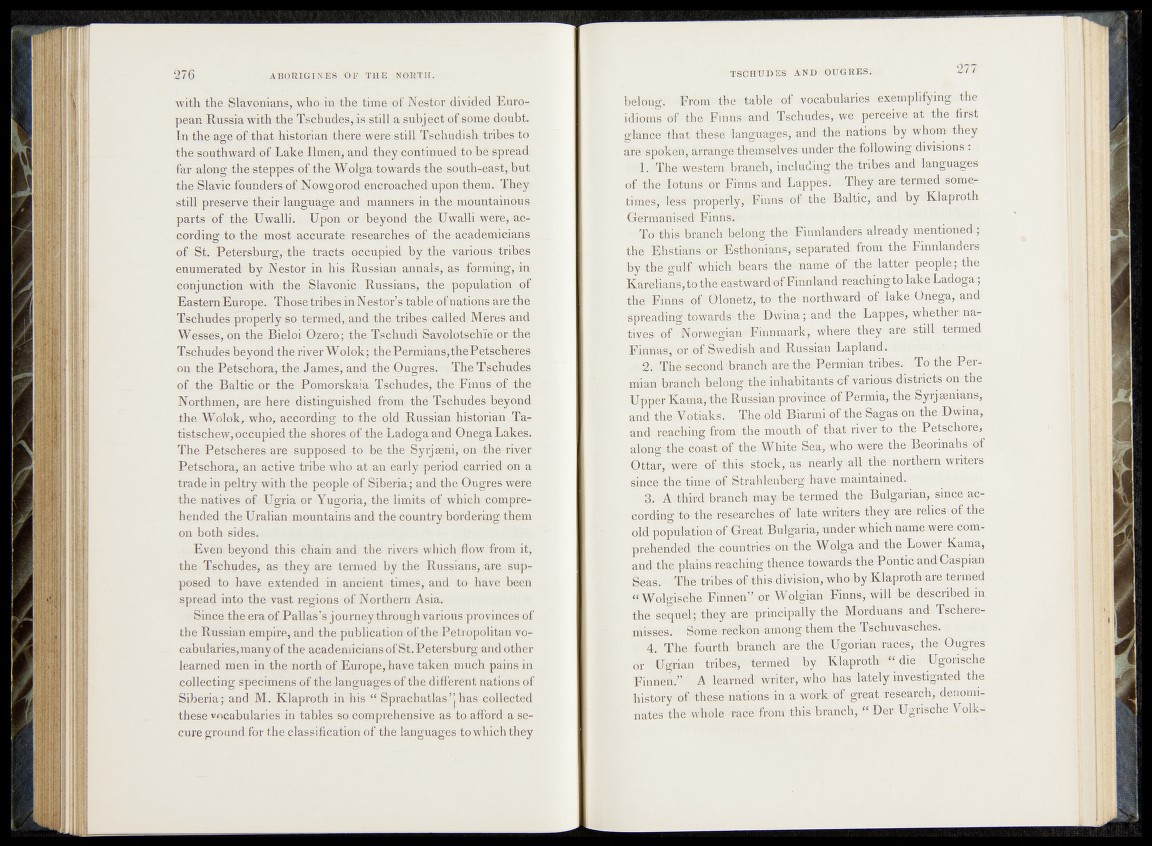
with the Slavonians,, who in-the time#fc-N,estor divided European
Russia with the Tschudes,*ts.still a^subject of;f?)ipfi$.do.u.b.t*
In the* ace of that historian there weuenstill.' O Tsshudi&h tribes! M
the southward of Lake Ilmen, and they contiriued.to bespread
far along the steppes*of the Wolga towards-the soutL-gdsi;;?hut
the Slavic founders of Mowgorod encroached upon them. They
still preserve their language and manners in the mountainous
parts of the Uwalli. Upon or beyond the; ;Uwalli were,gnp-
cording to the most accurate researches of; the academicians
of St. Petersburg,-the tracts occupied, by the/varipusi tribes
enumerated"by Nestor in his Russian, annals,: as fordoing, in
conjunction with the (.Slavonic Russians, the population* •■pf
Eastern Europe. Those tribes in Nestor’s table of nations ai;e the
Tschudesproperly id termed, and the tribes.*called Meresand
Wesses, on the Bielöi Ozero; theTschudi Sayolotschïè^Qrsthe
Tschudes beyond the river Wolok; thePermians,theRétsckere§
m the Petscbora, the James, and the Qugres.i. TheTëbbü'des
of the Baltic or the Pomorskaia Tschudes, the Finns-.off the
Northmèn^tö'e ihere;distinguished Trom the Tschudes beyond
the Wolok, who,; according to the ;old. Russian historian Ta-
tistschew, occupied the shores, of the Ladogaand QnegaLakes.
The Petschërea are supposed to be the S,yrjaeni,jon,fthe;riive!r
Petschora, an active tribe who at an early-period .carried on a
trade in peltry with the people of ..Siberia; and the Ougreswere
the natives of Ugria or Yugoria, the limits c^wldelÉ^fcap^e“
hended the Uralian mountains and the country borde ^ g them
on both sides,.
Even beyond this chain and the rivers which flow from it,
the Tschudes, as they are termed by the Russians, are supr
posed to have extended in ancient times, and to have been
spread into the vast regions of Northern Asia.
Since the era of Pallas’s journey through various provinces of
the Russian empire, and the publication of the Pet) ópolitan vocabularies,
m any of the academicians of St. Petersburg and other
learned .memin the north of Europe, have taken ^much pains in
collecting specimens of the languages/of the different nations of
Siberia; and M. Klaproth in his u Sprachatlas”. has collected
these vocabularies in tables so comprehensive as to afford a secure
ground for the classification of the languages to which they
b e lo n g F M ^ ^ / t a b l e *of ^fcfeabularies exemplifying the
idi!$i&^>b'f the^jKho&^n’nd’ Tschudiesr we perceive at the first
gla^itf^liiat the?s& a n d ‘theiBntions by whomofchey
are spokdhf 4#rR)h^e1'Mlhemsdl4cbliukffR©ith^folJfo wing «divisions :
1 . The'v^e^i^n hrantfh, in$ludl|iglffil?ffn'bes' andf languages
of #he lotmh^l^EiWfi^an'ddE^pp^^| They '»fe&teimed somef.
tiifit^lS&sS'tpi^erly/ sPmTfeiohi frkM BaJ|ise, and by .Klaproth
wU'W*!'~ <• i mltttmwmwy
K'T ^ 0 fg^te^an'chf bi$3Pf|'t'hef^Finril'EGnd^ .already:mentioned
iMe lEhst-iattsio# Es#cln-r^h^s®¥a,r^ ^ ^ ^ ^ ^ Finnlaader^
by t b e f ^ w h i c h Sear#* the/Maimk offth& ^ ^ l ^ e d p f e ; thcsr;
KaiTdian lf|@d h e^ ^# d fo fE in n lax i# ^ ^Mi!# t# atb.eLad®g^
the' 'Finns <of Olonet^ttb 5the ^Etfew/ardoof^krkei-^nega^and
SpttaflM^tpwards^^eJ D win a *;<»and^the dbapspds,! whether natives
‘df^W’OTwegiMn'i PinB-riaark, wher'e*' thbyx*a#elTs^ll termed
3j|innter,5“dr ofi^sve^ish- andfi|,nssiah Lapland; ;
Thlv^efcbnd'hranfcl' are th,e.Bermian ^ ite g b T o . the Permian
bran?^4Mfe^tkfeHnhabitapt^^lva®©usf-diatrAe# on the
Upf^gKamS' th e 'R u ^ sia s^ p ^ tA ^ o f Permia,^hej^yr|i8enianB^,
and th e* .y ;|iA if^ T le lk d [Bia*rmi^fIhe.Sagadori^e Dwma,
and pha»^iing||?‘Q4n* itfemaou-tht oKlh ^ii® er|i^ the Pefeschore,
along thei'Gpa'S.tMof the.*.*White^Sea^whower^#eiBeorinahs^f
Ot-tar, were «of th^stoek,A!a&rnea*rly4all the n o i^ fm w p te rs
s in g e^th e.^ti m iifo fi' Strahli^al^Egskay e m ain tap ^ l , f ^
, A third branch may.be termed the^Ru’lgafian^pneeRecording
totthe-’te'searches-nff late writers they aveireMesiiof the
7 |l(i population of Great Bulgaria, under w hichnam'ewerewsom-
prehenbed^the cbUntfies^oh the Wolga andfdha sEjawfer Kama,
ah# the plains reachiffgfthentce towards the Pontic and Caspian
Seas. ' The tribes of this division, who4xy Klaproth are termed
“ Wolgis'che Pinnen” or Wolgito--Finns, will be1 described in
the sequel; they are principally, the MorduanRtand Tscher.e^
misses. Someheckbn among them thfe-Tsohuvasefopss*$-
4. The'fourth branch are'theiUgorian ^#bes, the! Ougres'
ori !U|rian tribes-, termed by K la p ro th ^ dielaUgcmsche
FinneEl- A learned writer,‘who* has lately investigated the
history of these nations in a work of' great ffesdarch, denominates
the whole race1 from this branchy“ Der Ugt&che Volk